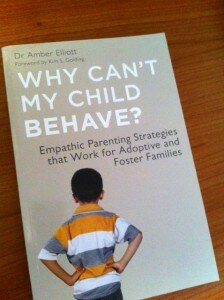This week the Department for Education announced a £19.3 million fund for therapeutic services for adopted children and their families. The news jostled with bigger stories and didn’t exactly grab the attention of the nation, but it’s something I’ve been waiting for a long time.
I occasionally blog for the online Social Work publication Community Care and for one article on post adoption support interviewed Hugh Thornbery, Chief Executive of Adoption UK. Some weeks later I found myself in a waiting room in the Department of Education with Hugh and Erica Pennington (AUK), sat in front of a rather large photograph of Michael Gove.
Fixing post adoption support can on the face of it seem a simple matter, but as with many simple matters, what lies within the nuts and bolts is far more complex.
Firstly, adopters have a right to an assessment of their family’s needs by their Local Authority, but no right to the support which that assessment flags up. It’s a fudge and a cruel one if you are on the receiving end. Local Authorities say that they don’t have the money to pay for therapeutic support, but once an adoptive family breaks down and a child ends up back in the care system the vast sums required are suddenly, albeit from a different budget, available. These costs dwarf what it might have cost to support that child within the adoptive family.
It would seem sensible to gather the costs of adoption breakdown and prove on a financial level that providing therapeutic support services is common sense. But of course, none such records are kept currently. So it’s all anecdote and hearsay and not enough to build a solid case on.
And lastly, just to really complicate matters, the NHS appears to have no obligation to treat traumatised children either. Adopted children are like the hot potato that no one wants to catch. The inequalities that the current status quo are built upon are astonishing and make creating any meaningful system of adoption support very difficult indeed.
However, despite the lack of data, the hearsay evidence and the lack of ownership, the government has listened to the experiences of many adoptive families and is taking steps to make real change. It is easy to be cynical and following the press release many were.
The meeting I went to was a small glimpse into the work which has gone on, but I came away heartened by the depth of understanding of trauma shown by the civil servants working on the project at the DfE (deeper and more compassionate than some professionals I have faced across a desk). I was struck by the impact that many personal accounts of adopters had clearly had and encouraged by the pressure being applied from above to get a sensible system of post adoption support in place. Both the civil servants and Adoption UK appeared clear-sighted, tenacious and creative in their efforts to put together a scheme of real substance and benefit to adoptive families.
In response to views canvassed from adopters the fund will not sit within the bureaucracies that many of us have long struggled with but will instead be accessed directly. As to how the fund will work in practicality, well the devil’s in the detail as they say and we will have to wait for the pilot schemes to work through.
Over the past ten years that I’ve been an adopter I’ve seen the narrative around adoption shift significantly. Once upon a time I felt like a lone preacher of some bizarre belief system. Now government is openly talking about trauma and therapeutic support and where they go I hope others will follow. Of course there is still plenty of work to do, not least for kinship carers and others caring for traumatised children, but credit where it’s due: this is a sea change and a big step forward.
Click here to read my press release.

